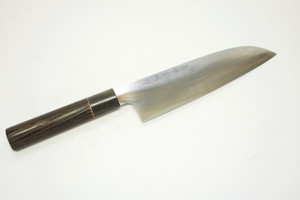
Yoshiaki Fujiwara Santoku 150mm
These beautiful knives are made by Mr. Kiyoshi Kato, born 1944 in Tokyo. He began sword-smith training in 1964, at the age of 20, and is currently a licensed sword smith. He now uses his incredible collection of very old, and difficult to obtain, Tamahagane steels to form his own sword masterpieces.
He entered the field of knife making in 1977 by creating his first hunting and kitchen knives, and currently makes knives in his new Hokuto City workshop, found in the Yamanashi Prefecture.
Mr. Kato uses a special quenching technique, utilizing charcoal and water, which imparts an extra degree of hardness not often seen in regular clad knives.This gives all of his kitchen knives a feel very similar to Honyaki, incredibly stiff with little to no flex!
I have been testing his kitchen knives for some time now, and must admit that they are incredible masterpieces in their own form and function!
It all began when I asked my source about a possible knife-maker similar to or possibly even better than Shigefusa. He quickly recommended Mr. Kato as he thinks his steels and metallurgical technique is among the best in Japan. Mr. Kato still hand makes all of his knives in methods more traditional than even Shigefusa uses. So, I asked him to send me a few prototype pettys and gyutos for an extensive test. The price was similar to Shigefusa so I expected to receive a pair of knives with Shigefusa personality- laser-like dimensions with extensive fit and finish. What I received, however, was more than a shock!!! After paying a Shigefusa price, I now had in my possession a pair of knives that were very thick, almost deba like, with ok fit and finish. This was indeed a disappointment, as my first reaction was, “I may have received the wrong knives”!!!
Then after touching up the edge, a miracle happened as I began to cut with one! From the first cut, I immediately realized what a huge mistake I had made, condemning these knives simply by the way they looked. In short, their performance is incredible, surpassing even that of Shigefusa. This is doubly surprising considering their thickness and finish. These knives are capable of quickly and easily tackling any job you throw at them. I wanted to independently verify my results, so I sold a few of the prototypes to some trusted customers and after a few weeks of testing, they were all in amazement as their initial impressions and successive observations were exactly the same as mine. So, I decided to have one last test at the June sharpening class. Again, these knives by look alone were disappointing to most, but by the end of the event almost everyone who had the pleasure of using these knives wanted to buy them!
Mr. Kiyoshi Kato makes very rarely single beveled knives, but when he do he uses a lot of time and care to produce this knives and he makes them only one by one never in batches ! On every tang there is old stile Kanji that telling era and dates when this particular knife is made !
This particular knife was in his shop/showroom as show piece so it is made some time ago. Special heat treatment and steel make this knife core super hard and very easy to sharpen. It is one of the Sharpest knives i have ever seen !
Nothing more to say then it is collective piece of a knife, super beautiful and super Hard.
Kato uses Japanese Natural Stones on his single beveled knives and hammers ura and finish it by hand with handheld stone ! Thats why you see that his single beveled cost more
Smaller Santoku NOT a JNS Workhorse line ! So bit wars FF but still very cool knife to use :D
Steel: Carbon Clad (can rust !! )
Handle: Ho wood with Blond Buffalo horn
Approx..... measurements:
Handle Length- 135mm
Handle Width- 20mm
Handle to Tip Length- 295mm
Heel to Tip Length- 150mm
Blade Height at Heel- 50mm
Width of Spine at Handle- 6,3mm
Width of Spine Above Heel- 4,8mm
Width of Spine at Middle- 2mm
Width of Spine tip- 1,4mm
Weight- 165g
All knives JNS cary is handmade and made one by one, so they can vary in size and thickness. Unevenness in finish can occur.









